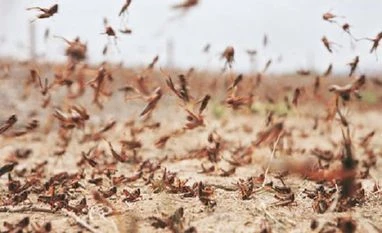India, which is tackling the worst locust attack in 26 years for the last three months, should remain on "high alert" during the next four weeks, according to the UN's Food and Agriculture Organisation (FAO).
Meanwhile, the Indian government has stepped up efforts and is using latest technology and equipment like drones and Bell helicopters for control of the menace.
Rajasthan is the most affected state in the country. The other affected states are Madhya Pradesh, Punjab, Gujarat, Uttar Pradesh, Maharashtra, Chhattisgarh, Haryana and Bihar.
In its latest update, the FAO said that spring-bred locust swarms that migrated to Indo-Pakistan border and travelled east to northern states, are expected to return to Rajasthan with the start of monsoon in coming days.
These swarms will return to Rajasthan to join other swarms still arriving from Iran and Pakistan, which is expected to be supplemented by swarms from the Horn of Africa in about mid-July, it added.
"Early breeding has already occurred along the Indo-Pakistan border where substantial hatching and band formation will take place in July that will cause the first-generation summer swarms to form in mid-August," FAO said.
India and Pakistan as well as Sudan, Ethiopia, South Sudan and Somalia should remain on "high alert during the next four weeks," it noted.
According to the Union Agriculture Ministry, swarms of immature pink locusts and adult yellow locusts are active in Jaisalmer, Barmer, Bikaner, Jodhpur, Nagaur, Dausa, and Bharatpur of Rajasthan, and Jhansi and Mahoba districts of Uttar Pradesh.
However the government is continuing the control operations to check damage to crops from locust attacks.
On July 4, a Bell Helicopter took its first sortie in Jaisalmer district of Rajasthan and completed its mission of chemical spraying in targeted areas, thereby augmenting the locust control efforts.
In the intervening night of July 3-4, control operations were carried out at 25 places in six districts (Jaisalmer, Barmer, Bikaner, Jodhpur, Nagaur, and Dausa) of Rajasthan and two places in Jhansi district of Uttar Pradesh by the Locust Circle Offices (LCOs), it said.
Besides this, State Agriculture Departments also carried out control operations at four places in Jhansi and Mahoba districts of Uttar Pradesh and at two places in Bharatpur district of Rajasthan against small groups and scattered population of locusts.
So far, locust control operations have been done in a total 1,35,207 hectares area in Rajasthan, Madhya Pradesh, Punjab, Gujarat, Uttar Pradesh and Haryana by the Locust Circle Offices (LCOs).
The state governments have also taken control measures in 1,13,215.5 hectares area in Rajasthan, Madhya Pradesh, Punjab, Gujarat, Uttar Pradesh, Maharashtra, Chhattisgarh, Haryana and Bihar.
"No significant crop losses have been reported in Gujarat, Uttar Pradesh, Madhya Pradesh, Maharashtra, Chhattisgarh, Bihar and Haryana. However, some minor crop losses have been reported in some districts of Rajasthan," the ministry said.
Presently, 60 control teams with spray vehicles are deployed in Rajasthan, Gujarat, Madhya Pradesh and Uttar Pradesh.More than 200 central government personnel are engaged in locust control operations.
Besides, five companies with 12 drones are deployed at Barmer, Jaisalmer, Bikaner, Nagaur and Phalodi in Rajasthan for effective control of locusts on tall trees and in inaccessible areas through spraying of pesticides.
India is the first country which is using drones for locust control, the ministry said.
Weekly virtual meetings on desert locust of South-West Asian countries (Afghanistan, India, Iran and Pakistan) is being organised by the FAO.
So far, 15 virtual meetings of the technical officers of these countries have taken place, the ministry added.
Unlock 30+ premium stories daily hand-picked by our editors, across devices on browser and app.
Pick your 5 favourite companies, get a daily email with all news updates on them.
Full access to our intuitive epaper - clip, save, share articles from any device; newspaper archives from 2006.
Preferential invites to Business Standard events.
Curated newsletters on markets, personal finance, policy & politics, start-ups, technology, and more.
)